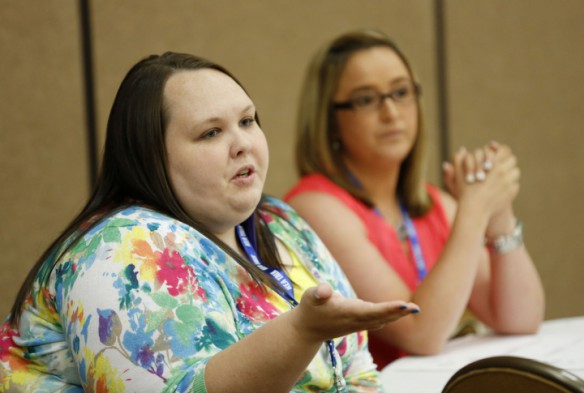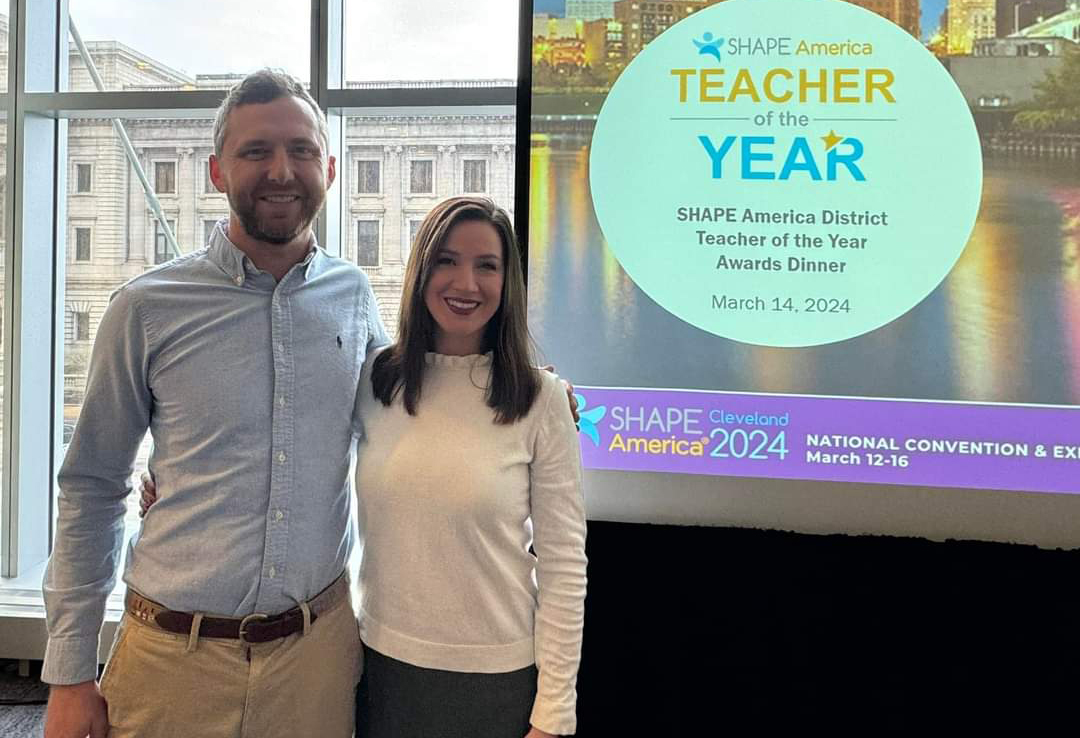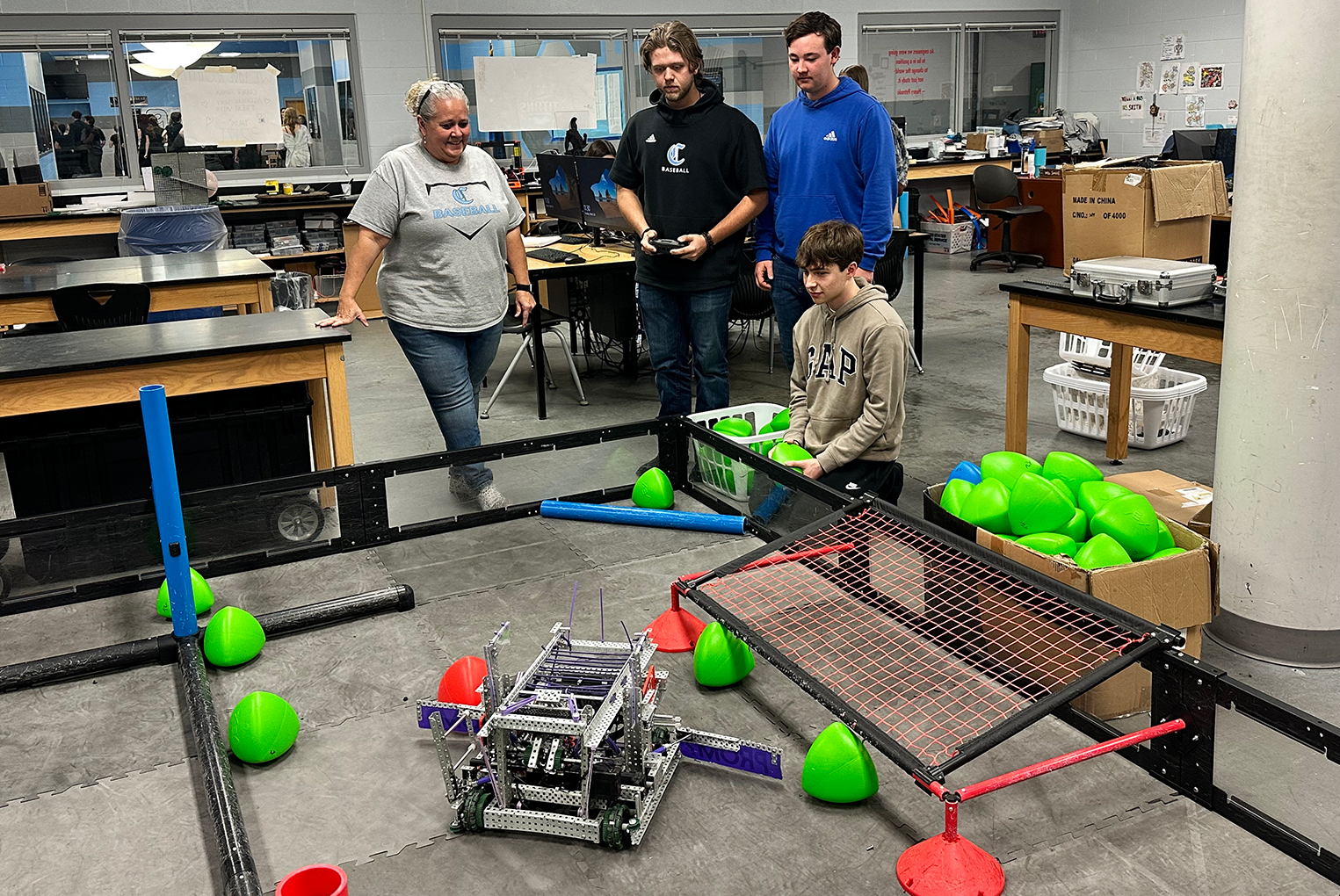
Cowan Elementary School (Letcher County) teachers Paige Adams and Evelyn Lumpkins talk with presenter Holly Linville, a teacher at Deming School (Robertson County) about how they are doing formative assessment at their school during the Let’s TALK conference in Louisville.
Photo by Amy Wallot, June 20, 2013
By Matthew Tungate
matthew.tungate@education.ky.gov
As Heidi Hayes Jacobs, a national expert on curriculum design, started her keynote address to the Let’s TALK: Conversations about Effective Teaching conference in Louisville last week, she invited teachers with tablet and laptop computers to share their thoughts with her throughout her speech in a TodaysMeet online room.
Using the backchannel technology in a room full of eager learners was just the precursor to her address on improving teaching in the 21st century that included numerous examples of websites and digital resources for teachers. Jacobs encouraged educators to be continuous learners who embrace technology rather than rely on outdated 20th-century methods.
“There’s not a parent in this room who would take their child to a doctor using techniques from the 1970s,” she said. “How would you feel if your doctor said, ‘Oh, there’s just too many breakthroughs.’”
Jacobs, executive director of the Curriculum Mapping Institute and president of Curriculum Designers Inc., was one of more than two dozen presenters at the conference for, by and about teachers. The goals for the conference were for the nearly 370 attendees to:
- gain practical strategies for implementing the Kentucky Core Academic Standards in their classrooms
- learn how they can improve teaching and learning through the new Professional Growth and Effectiveness System (PGES)
- bring the teacher voice to education initiatives
- elevate the profession of teaching through multiple sharing and professional learning opportunities
Deanna Barton, who works at Allen Central Middle School and James Allen Duff Elementary School (Floyd County), said she is “all about using technology” as a special education teacher for low-functioning students.
She particularly appreciated learning about Edmodo, ClassDojo and “all of these free websites that teachers are using to engage their students in classes.”
Barton agreed with one of Jacobs’ points that teachers have to join students in the modern era.
“Kids are different than they used to be 10, 15, 20 years ago, so we have to change in order to keep our kids engaged and promote that learning,” she said.
Rick Stoner, a 1st-grade teacher at Coleridge-Taylor Montessori Elementary School (Jefferson County), said he learned a lot about various uses of technology, including the Continuous Instructional Improvement Technology System (CIITS) and PD360.
“So, I’m going to implement these,” he said. “I’ve been writing ideas vigorously, gleaning ideas from these presenters.”
Stoner is concerned about a digital divide between more affluent students who can obtain laptops, tablets and smartphones, and those like he teaches who are economically challenged.
“I think the kids I have in my classroom typically have more TVs than people in the house, and the ratio of people to computers is way too high – and the ratio of books to people is way too low,” he said. “It presents some challenges.”
Laurie Babbs, a science teacher at Webster County High School, said she is concerned about the digital divide between school districts that have invested in technology and those that haven’t.
For instance, she went to a session on the flipped classroom, but she doesn’t have an iPad or tablet for every student.
“The flipped classroom, I think, is wonderful if you have the technology,” Babbs said.
She and one of her colleagues were talking about how they could apply for grants to get more technology. Still, she said it was helpful that Jacobs and other presenters gave examples of websites and sources teachers could use.
Emmanuel Anama, who teachers Spanish at all five Letcher County middle schools, agreed.
“As a Spanish teacher, I’m always looking for stuff from the actual country that students can use as an authentic resource, and we were shown so many today,” he said. “I think that’s something that I’m going to be able to do to engage the students at a new next-generation, global-learning level.”
Besides technology, the PGES was a hot topic of interest.
Babbs said she attended several sessions to learn more for herself, because everything administrators told her gave her a reason to worry.
“After seeing this, I feel a whole lot better,” she said.
Babbs has thought about talking with her colleagues about how they complain they don’t have a lot of voice in education, “but this is going to give us the voice.” She likes that the PGES contains professional growth goals specific to teachers and their students.
“So now I’ve got more of a handle on it than somebody coming and telling me what I need to do when — they don’t really know what I need to do,” Babbs said.
She also learned about SMART goals and how to implement them for her classes.
Anama suggested teachers should start learning for themselves about the PGES, because they may be getting bad information.
“Don’t view it as something bad, but view it as something good that they can actually utilize to help them become a better teacher for those students who we teach every single day,” he said.
Participants could choose from more than two dozen sessions ranging from the specific, like The Power of the Graphic Novel to engage students, to the general, like Literacy Strategies to Engage All Learners.
Stoner said he is interested in the achievement gap, so he attended a session on it. He said the conference was certainly worthwhile.
“I’ve got a whole back page of notes. One session I went to, it’s filled with notes from A to H of things I need to do,” he said. “I got a lot of homework based on this conference.”
Anama went to a session about National Board Certification “and it really gave me that extra boost of encouragement to go ahead and do it.”
He, too, found the conference to be effective and said he learned a lot.
“The last few days have really shaped me a lot as an educator,” Anama said. “I really didn’t anticipate so much shaping, but it’s been wonderful.”
The Let’s TALK: Conversations about Effective Teaching conference was co-sponsored by the Kentucky Department of Education, Kentucky Education Association and the Prichard Committee for Academic Excellence with funding by the Bill & Melinda Gates Foundation through the Fund for Transforming Education in Kentucky.







Leave A Comment